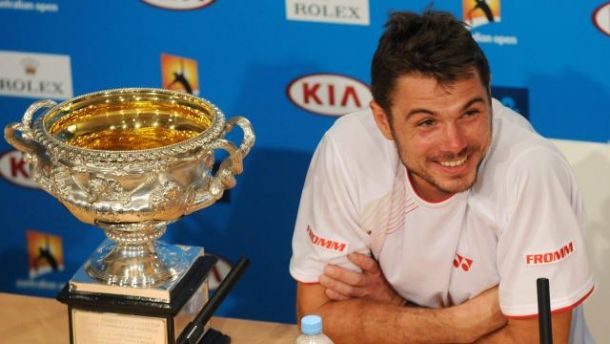With the Australian Open over, the latest ATP & WTA world tour rankings have been released, with notable differences. After his triumph, Stan Wawrinka is up to 3rd, probably deservedly, but below him is where controversy kicks in. Dominika Cibulkova got to the final of the Australian Open saw her ranking rise to 13th in the world which is fair enough but can she defend those points next year?
Juan Martin Del Potro, having exited in the 2nd round moves up to 4th, while Murray and Ferrer, both quarter finalists, drop 2 places each. Read a full detailed report here.
Latest ATP/WTA Ranking Changes
Firstly I'll clarify the current system. Each tournament has a set amount of points, Grand Slams being 2000, ATP/WTA tour events being 1,000, 500 and 250 respectively. Once you have these points, they stay around for 52 weeks (1 year) until they are removed. This is why the term ‘Defending points’ is used. For example, in 2013 Novak Djokovic won the Australian Open, earning him 2000 points. This year, he reached the QF, earning 360 points. The 2000 are taken away though, so in effect he loses 1640 points. Here is a full breakdown -
There are a few reasons this format is bad, in my opinion. Firstly, it is unfair on injured players. If you win a slam, then don’t compete the next year, all your points are gone. For arguments sake, say the rankings stay exactly the same until the 2015 Aus Open and Wawrinka is injured, he’d drop from 3rd to 8th. Another point is a fluke victory earns so, so many points. Imagine you’re a lucky loser like Stephane Robert in the recent Aus Open, Murray pulls out injured, you stun Federer and Nadal gets injured, then Wawrinka loses to you in the final. Extremely unlikely, but possible. He’d get 2000 points, and jump 115 places. This is a very extreme scale I’m showing, but something less extreme could easily happen, like a 20th seed winning.
“Form is temporary, class is permanent”
So, I have a plan. There are 2 main points in this plan:
Don’t just use 1 year.
Something that really annoys me is that only the last year points count. Clearly, the most recent year is the most important, but surely you’ve heard the quote “Form is temporary, class is permanent”? One bad year doesn’t mean you’re no longer a top class player. So, my idea is this - The longer ago, the less the impact. Players earn 100% of points gained in the most recent year, 50% of points for last, 25% for the year before. This means players’ off days don’t ruin their ranking, but they can’t stay high from past success.
Take an average from each set of tournaments, not individual tournaments.
This sounds a bit confusing but it’s not. In 2013, Novak Djokovic earned 5120 of his total 12,260 points from slams. In this system, we have an average of each discipline, so we get a Grand Slam average of 1280 points as he played in all four. We would also do this for ATP Masters 1000, 500 and 250, along with Davis / Fed Cup as well as tournaments on the WTA tour to. I would also lower the amount of points for ATP / WTA World Tour finals. This idea is for two reasons - To make the rankings closer, and to compensate for missed tournaments. However, there would need to be rules about how many of each you must play in, so players can’t win one of each category and not play all season.
Hopefully you have understood me throughout. Any questions or views? Tweet us @VAVEL_Tennis.









































